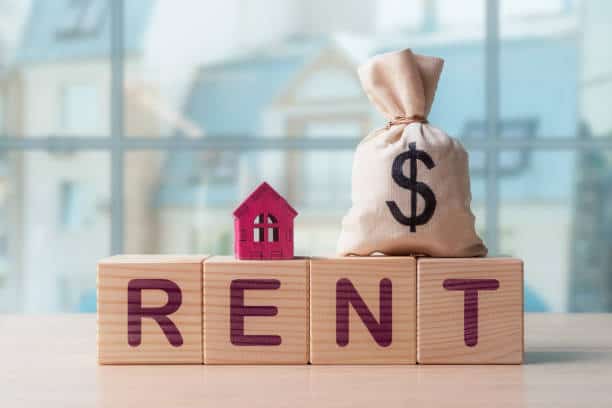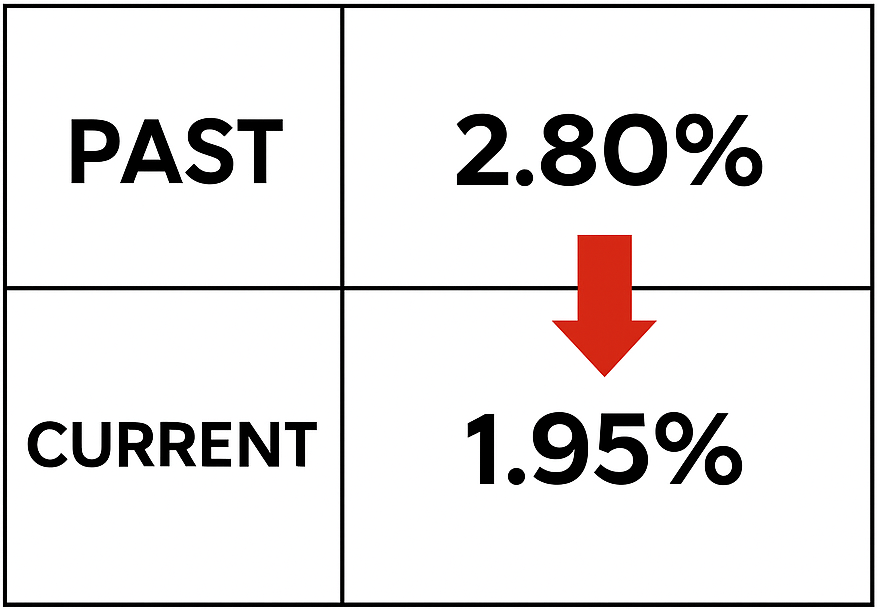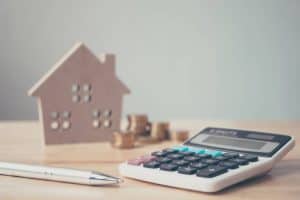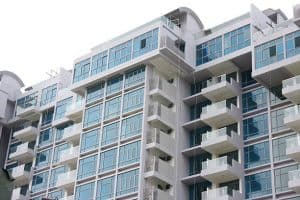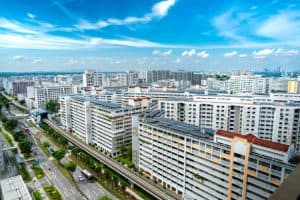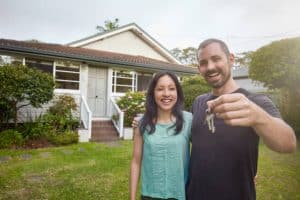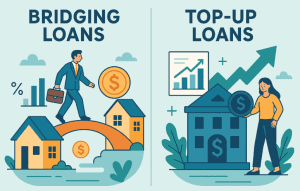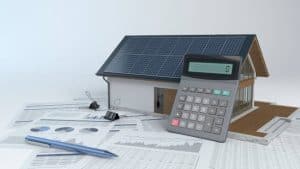Thinking of earning passive income through rental property in Singapore? Before jumping in, it’s key to understand one thing — rental yield. It’s not just about collecting rent, but knowing what your actual returns (net ROI) look like after all the costs.
In this quick guide, we’ll show you how to calculate rental yield in Singapore, what counts as a good return in 2025, and how to avoid common mistakes investors make.
Let’s break it down — simple, clear, and to the point.
What Is Rental Yield and Why Does It Matter?
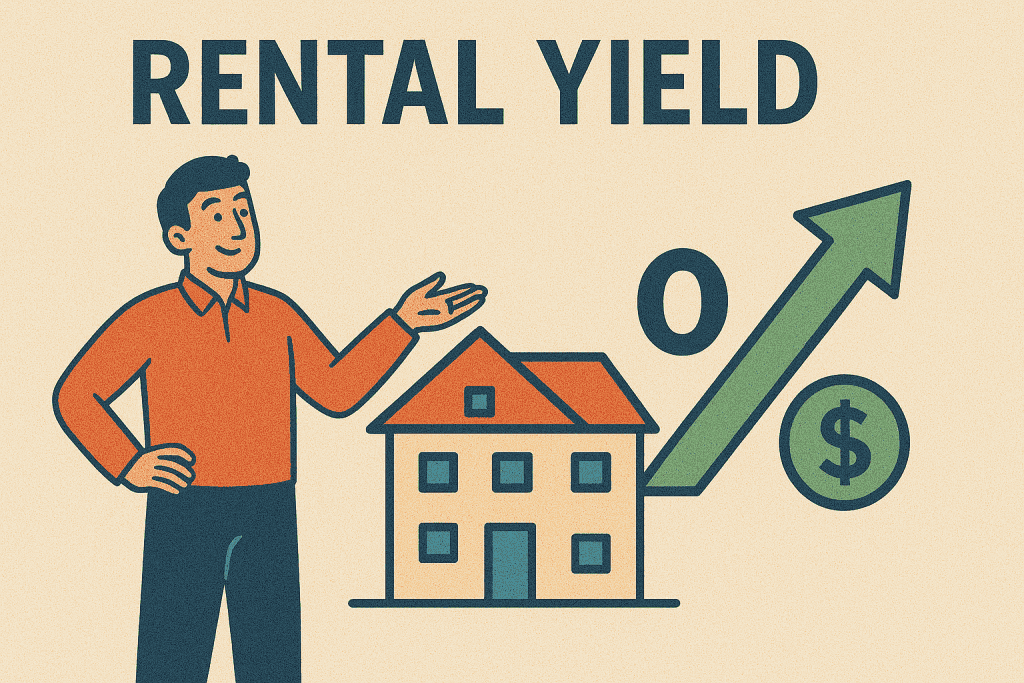
If you’re planning to invest in property in Singapore, understanding rental yield is non-negotiable. It’s one of the most important metrics for measuring how profitable your rental property really is — especially in a high-cost market like ours.
With rising mortgage interest rates in Singapore, knowing your expected rental return can make or break your investment. Whether you’re eyeing an HDB, condo, or private home, rental yield helps you compare options objectively — not just based on location or price, but on actual returns.
What Is the Definition of Rental Yield in Singapore?

In simple terms, rental yield is the percentage return you earn from renting out a property — based on how much you paid for it. It’s one of the key ways property investors in Singapore evaluate whether a home is “worth it” financially.
There are two types of rental yield you’ll often hear about:
- Gross rental yield: Calculated using annual rental income divided by the property price.
- Net rental yield: A more accurate picture that factors in costs like mortgage loan repayment, property tax, and maintenance fees.
In Singapore, rental yield is especially important in 2025 as property prices remain high, and returns can vary significantly between HDBs, condos, and even by location.
Why Is Rental Yield Important for Property Investors?

Rental yield tells you how hard your money is working. A condo that “looks good” on paper might actually give you lower returns than a modest resale HDB flat with strong rental demand.
Expert tip: Always calculate net rental yield — not just gross. Gross yield looks impressive, but net yield shows your real income after all the hidden costs.
With current home loan rates in Singapore, it’s critical to know whether your property can cover costs and still provide passive income. Rental yield helps you spot red flags early — especially if you’re comparing HDB loan vs bank loan options.
What’s the Difference Between Rental Yield and ROI?
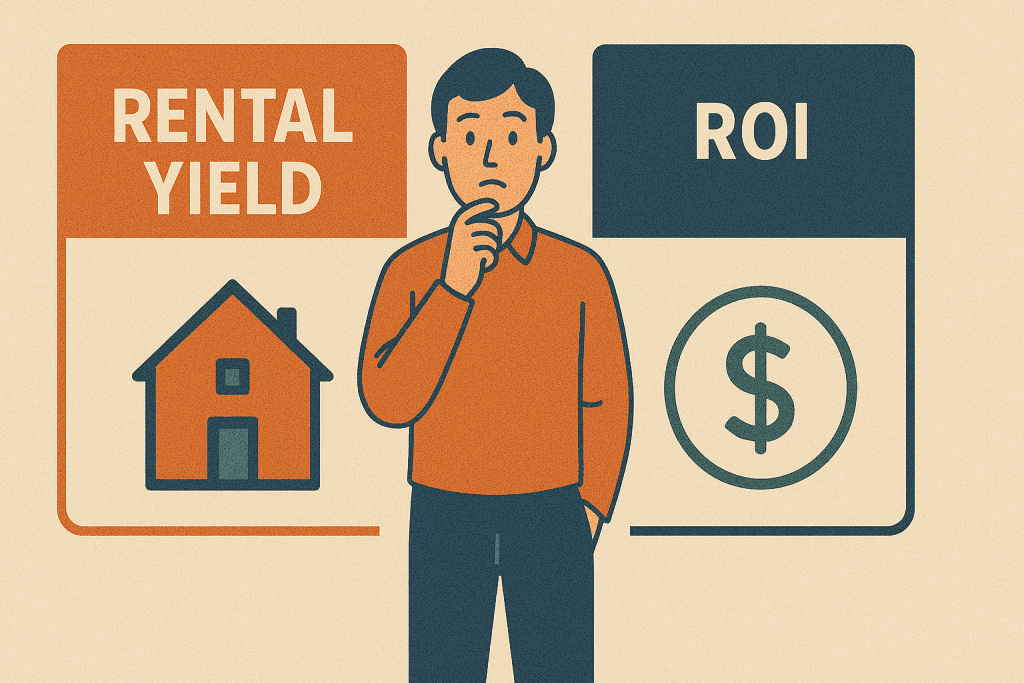
Here’s where many new investors get confused: rental yield is based on your property price and rental income, while ROI (Return on Investment) takes it further. ROI includes everything — like your upfront costs, renovation spend, and even interest paid on your mortgage loan in Singapore.
In short:
- Rental yield = income from rent
- ROI = total return including capital appreciation and financing costs
If you’re investing for long-term gains, both matter. A high yield doesn’t always mean high ROI — especially if your loan eats into your profits or the property sees slow appreciation.
How to Calculate Gross and Net Rental Yield

If you want to make smarter investment decisions, learning how to calculate rental yield in Singapore is essential. It’s not rocket science — but doing it right separates casual landlords from savvy property investors.
Let’s break down both gross and net rental yield — and show you exactly what numbers to use.
Gross Rental Yield Formula (Step-by-Step)

Gross rental yield gives you a quick snapshot of your returns, before accounting for any costs.
Formula:
📌 Gross Rental Yield = (Annual Rental Income ÷ Property Purchase Price) × 100
Example:
- Monthly rent: $3,000
- Annual rent: $36,000
- Property price: $900,000
Gross Yield = ($36,000 ÷ $900,000) × 100 = 4.0%
That 4% might look pretty decent — but it’s only the surface. Time to dig deeper.
Net Rental Yield: What Costs to Include

To find out your actual rental return, you’ll want to calculate net rental yield, which subtracts annual costs from your rental income.
Costs to factor in:
- Mortgage interest (use our calculator here)
- Property taxes (IRAS)
- Condo maintenance or MCST fees
- Insurance
- Rental agent fees (if applicable)
- Vacancy buffer (e.g. 1–2 months’ rent loss)
Formula:
Net Rental Yield = [(Annual Rent – Annual Costs) ÷ Property Price] × 100
This is the number serious investors focus on — because it reflects what you’re actually putting in your pocket.
Example Calculation Using a 2-Bedroom Condo

Let’s say you’re looking at a new launch condo in District 15.
Condo Rental Yield Case Study in Singapore (2025): District 15 Example
| Item | Amount (SGD) |
|---|---|
| Monthly Rental Income | $3,200 |
| Annual Rental Income | $38,400 |
| Property Purchase Price | $950,000 |
| Annual Loan Interest (Estimate) | $12,000 |
| MCST Maintenance Fees | $2,400 |
| Property Tax | $1,800 |
| Vacancy Loss (1 month rent) | $3,200 |
| Total Annual Costs | $19,400 |
| Net Rental Income | $19,000 |
| Net Rental Yield | 2.0% |
If you’re using a private property loan or financing with a bank, this yield helps you judge if your loan and holding costs are sustainable long-term.
Pro tip: Always compare net yield against your mortgage interest rate in Singapore — especially if you’re using fixed rates or refinancing.
What Is a Good Rental Yield in Singapore (2025)?

Knowing what’s considered a “good” rental yield isn’t just about numbers—context matters. As of mid‑2025, rental prices and interest rates have both climbed. Investors need benchmarks that reflect the current landscape—whether you’re looking at HDB, EC, or private condos.
Average Rental Yields for HDB, Condo, and EC Properties

The latest URA data shows private residential rents rose 0.4% in Q1 2025, while prices climbed more modestly. Combined with globalpropertyguide.com, the average gross rental yield for private homes stands at 3.29% in mid‑2025
Breakdown by unit type (gross yield):
- 1‑bedroom condo: ~3.44%
- 2‑bedroom condo: ~3.28%
- 3‑bedroom condo: ~3.00%
- HDB resale flat: ~2.9–3.1%
- Executive Condo (EC): ~3.3–3.8%
How Location and Property Type Affect Yield
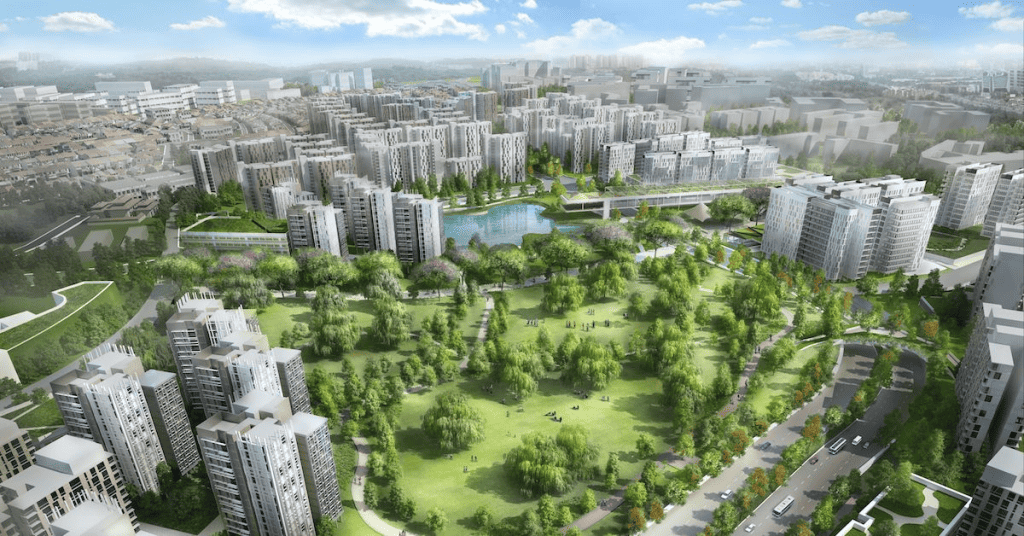
Yields vary significantly by location:
- Heartland condos (e.g., Hougang/Punggol/Sengkang): ~3.5–4.0%
- Prime districts (CCR): ~2.7–3.2% — premium prices mean lower return percentages
Pro tip: For stronger yields, consider heartland condos or ECs rather than high-priced prime condos. They often offer better net returns after factoring in costs.
What Yield Is Considered “Healthy” in Today’s Market?

Here’s a quick snapshot of what net yields investors are realistically achieving as of July 2025:
Singapore Property Rental Yields in 2025: HDB, EC & Condo Net Returns Compared
| Property Type | Gross Yield | Net Yield (Post-Costs) |
|---|---|---|
| Resale HDB | 3.0–3.3% | 1.8–2.2% |
| Executive Condo (EC) | 3.3–3.8% | 2.0–2.5% |
| Private Condo (Heartland) | 3.5–4.0% | 2.3–2.7% |
| Private Condo (Prime) | 2.7–3.2% | 1.7–2.2% |
These figures reflect the thumb rule: a net yield around 2% or higher is healthy in today’s mortgage and financing environment.
Investor tip: Compare your projected net rental yield against your mortgage interest rate in Singapore—if yield isn’t comfortably above your cost of financing (typically 2.5–3%), your investment isn’t generating real income.
In Summary…
- Gross yields are averaging 3.3% mid‑2025; net yields range 2.0–2.7% after costs.
- Better net returns typically come from heartland condos or ECs—not expensive prime condos.
- Always benchmark against current home loan rates in Singapore.
Coming up next: Want to see how this plays out in real life? We’ve got a case study ready to walk you through the numbers step by step.
Common Mistakes When Calculating Rental Yield

Even seasoned investors make slip-ups when crunching the numbers. And when it comes to rental yield in Singapore, small calculation errors can lead to big surprises down the road — especially with rising housing loan interest rates and maintenance costs in 2025. Here are the most common pitfalls to watch out for.
Forgetting to Include Property Taxes, Maintenance, and Vacancies

Many first-time landlords only look at rental income vs property price — but your actual returns are shaped by your costs.
Here’s what people often leave out:
- Property tax (based on annual value set by IRAS)
- Condo maintenance fees (MCST) or town council charges
- Insurance premiums
- Agent commissions
- Vacancy periods — even 1–2 months of empty units a year can dent returns
Tip: When calculating net rental yield, always assume at least one month of vacancy per year. And use a mortgage repayment calculator to accurately reflect monthly loan obligations.
Using Gross Instead of Net Yield for Investment Decisions

Gross yield is great for a quick comparison, but it doesn’t tell the full story. Many investors get excited by a 4%+ gross yield — but forget that once they subtract loan interest, maintenance, and fees, they’re left with barely 2%.
That’s why serious investors use net rental yield as their core decision-making metric — especially when comparing private property loans across banks or deciding whether to go for a new launch or resale unit.
A gross yield of 3.8% might look great — until you realise you’re actually earning under 2% net after financing and costs.
Overestimating Rent or Underestimating Holding Costs

It’s easy to assume you’ll get top-dollar rent or that expenses won’t fluctuate — but that’s rarely how it plays out.
Common overestimations:
- Expecting rental income at peak market rates
- Forgetting about interest rate hikes (especially if not on a fixed mortgage)
- Underbudgeting renovation or furnishing costs
With mortgage interest rates in Singapore still higher than pre-2022 levels, even a small miscalculation can leave you with negative cash flow.
Pro tip: Use conservative estimates. If a similar unit rents for $3,000, assume $2,700. And always buffer at least 10–15% in annual holding cost variation.
How to Boost Your Rental Yield in Singapore

Once you’ve locked in a unit, your next goal is simple: make it work harder for you. Improving rental yield in Singapore isn’t just about buying the right property — it’s about optimising how you rent it out. From unit size to lease strategy, small tweaks can lead to noticeably better returns.
Choosing the Right Unit Size and Layout

In 2025, 1- and 2-bedroom units continue to offer the strongest rental yield percentages — typically 3.2%–4.0% — especially in city fringe or heartland areas.
Why smaller units perform better:
- Lower overall price means yield (as % return) is naturally higher
- Wider tenant pool, especially singles, couples, or small families
- Easier to furnish and maintain
Tip: Look for layouts with minimal wasted space (e.g. no long corridors), open kitchens, and functional living areas. Tenants notice.
Renovations and Furnishing Strategies That Attract Tenants

Tenants don’t just rent on price — they rent on feel. A freshly painted, well-furnished unit can command 10–20% higher rent than a bare, dated one.
Key upgrades that pay off:
- Add air-conditioning, good lighting, and durable flooring
- Invest in neutral, modern furnishings — IKEA doesn’t always cut it
- Provide essentials: washer/dryer, microwave, basic kitchenware
But don’t overdo it — avoid luxury fittings unless you’re in a high-end district. The key is to match the renting expectations of your target tenant without overspending.
Need financing for light reno works? Consider whether your private property loan can support renovation budgeting during purchase.
Lease Terms, Dual-Key Units, and Tenant Screening

How you structure your lease can also impact your rental returns.
- Dual-key units: A popular way to maximise yield. You can rent to 2 separate tenants (e.g. a couple + a student) and earn 15–25% more in combined rental income.
- Longer leases (2 years): Offer stability and reduce vacancy downtime.
- Tenant quality: Never skip screening. A high-paying tenant who leaves early or causes damage is worse than a lower-paying, stable one.
Pro tip: If you’re buying for rental, consider dual-key layouts right from the start — they may cost more upfront, but the yield boost could justify it.
Final Thoughts: Use Rental Yield to Guide Smarter Investments

Understanding your rental yield is more than just a formula — it’s a mindset. In Singapore’s fast-moving market, knowing how to measure and interpret your property’s income potential is what separates confident investors from speculative buyers.
As interest rates and housing prices shift, a good yield isn’t just “nice to have” — it’s your safety net.
When to Speak to a Mortgage Advisor to Maximise ROI

If you’re planning to finance your property or considering refinancing, it’s worth speaking to a mortgage broker in Singapore. They’ll help you:
- Compare interest rates across banks
- Structure your loan for stronger monthly cash flow
- Time refinancing to reduce holding costs
A small difference in home loan rates in Singapore can significantly affect your net rental yield — especially over a 25-year loan.
Tools and Calculators You Can Use

Use these free tools to run your numbers before committing:
Whether you’re budgeting upfront or planning long-term, these tools help you make decisions with clarity — not guesswork.
If you’re just starting out or want the full picture, check out our step-by-step guide:
👉 How to Invest in Rental Property in Singapore
It walks you through everything — from financing and yield, to tax rules, hidden costs, and more.

